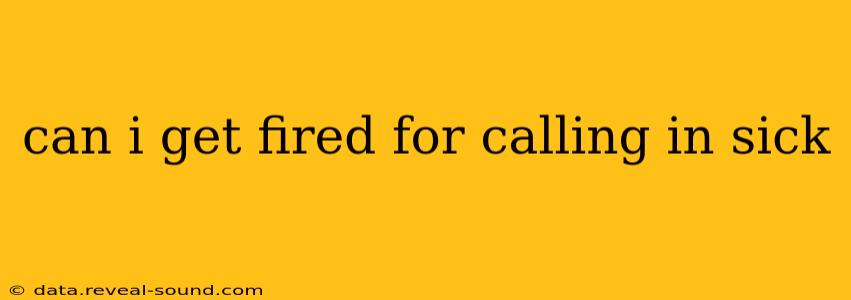Can I Get Fired for Calling in Sick?
The short answer is: it depends. While generally, you can't be fired simply for calling in sick, there are circumstances where your employer might have legitimate grounds for termination. This article will explore the nuances of calling in sick and the potential consequences, helping you understand your rights and responsibilities as an employee.
Understanding Your Employment Rights
In many countries, including the United States, there are laws protecting employees from unjust dismissal. However, these laws often don't offer blanket protection for all instances of calling in sick. The specifics vary based on several factors:
- Your Employment Status: Are you an at-will employee, or do you have a contract specifying your terms of employment? At-will employees can generally be fired for any reason not explicitly prohibited by law (e.g., discrimination). Employees with contracts have more protection and can only be fired under the terms outlined in their contract.
- Your Company's Policies: Review your company's handbook or policies regarding sick leave. These often outline procedures for reporting absences and may specify consequences for excessive or suspicious absences.
- Your Frequency of Absences: Occasionally calling in sick is generally acceptable. However, frequent absences, especially without proper notification or documentation, can be a legitimate cause for concern and potential disciplinary action.
- The Reason for Your Absence: While a genuine illness is a protected reason for absence, faking illness or providing false information can lead to disciplinary action, up to and including termination.
- Your Job Responsibilities: If your absence significantly impacts your employer's operations, especially in critical roles, it might increase the likelihood of disciplinary action.
How Often is Too Often to Call in Sick?
There's no magic number, as it depends heavily on company policy and the nature of your role. However, consistent or frequent absences, regardless of reason, can be a red flag. A pattern of calling in sick may lead to suspicion, questioning, and ultimately, termination.
What if I Need to Call in Sick Frequently Due to a Medical Condition?
If you have a chronic or ongoing medical condition requiring frequent absences, it's crucial to discuss this with your employer and potentially explore options like the Americans with Disabilities Act (ADA) accommodations (in the US) or similar legislation in your country. Open communication and documentation are vital in such cases.
What if I Called in Sick and My Boss Suspects I'm Lying?
If your boss suspects you're not genuinely ill, they might investigate. This could involve asking for doctor's notes or checking your social media activity. Providing truthful information and cooperating with any investigation is crucial. Lying or being evasive will severely damage your credibility and could lead to termination.
What Documentation Do I Need to Provide When Calling in Sick?
Company policy will dictate what, if any, documentation is required. Some employers may only require you to notify your supervisor, while others might demand a doctor's note for absences exceeding a certain duration. Always follow your company's established procedures.
Can I be fired for calling in sick on a Friday or Monday?
While there's no legal basis to fire someone solely for calling in sick on a Friday or Monday, suspicious patterns might raise concerns. If you frequently call in sick before or after weekends or holidays, your employer may become suspicious of your honesty.
In Conclusion:
While you generally shouldn't be fired for legitimately calling in sick, it's crucial to be responsible and transparent with your employer. Familiarize yourself with your company's policies, communicate honestly, and consider seeking legal advice if you face disciplinary action you believe is unfair. Open communication and adherence to company policies are your best defenses against potential issues.
